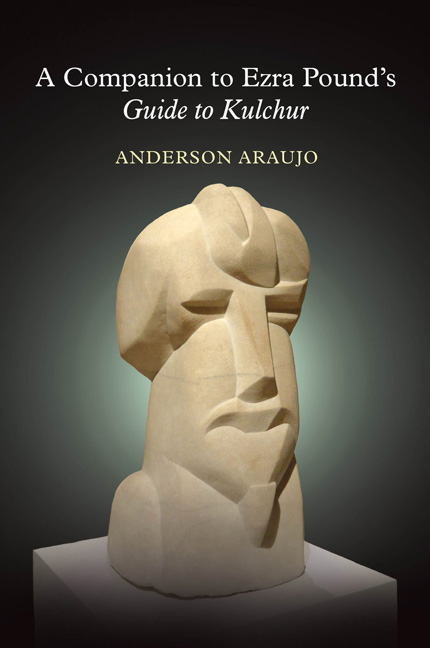Book contents
- Frontmatter
- Contents
- Acknowledgments
- Abbreviations
- Introduction
- Guide to Kulchur
- Part I
- Section I
- 1 Digest Of The Analects
- 2 The New Learning: Part One
- 3 Sparta 776 B.C.
- 4 Totalitarian
- 5 Zweck or the Aim
- Section II
- Part II
- Section III
- Section IV
- Part III
- Section V
- Section VI
- Part IV
- Section VII
- Section VIII
- Section IV
- Part V
- Section X
- Section XI
- Part VI
- Section XII
- Section XIII
- Addenda: 1952
- Notes
- Index
4 - Totalitarian
from Section I
- Frontmatter
- Contents
- Acknowledgments
- Abbreviations
- Introduction
- Guide to Kulchur
- Part I
- Section I
- 1 Digest Of The Analects
- 2 The New Learning: Part One
- 3 Sparta 776 B.C.
- 4 Totalitarian
- 5 Zweck or the Aim
- Section II
- Part II
- Section III
- Section IV
- Part III
- Section V
- Section VI
- Part IV
- Section VII
- Section VIII
- Section IV
- Part V
- Section X
- Section XI
- Part VI
- Section XII
- Section XIII
- Addenda: 1952
- Notes
- Index
Summary
nous … full of light: The nous, spirit-mind (or intellect), is a concept Pound adapted from Plotinus (c.205–70 CE), Greek philosopher and founder of Neoplatonism. As Liebregts explains, Pound “linked activity with light and energy, and passivity with matter, while connecting both with this concept of the nous as a creative force” enabling humanity to create new forms and modes of expression and to translate “knowledge of eternal truths.” In Canto 40, as in GK, the nous is imaged as “the ineffable crystal” (40/201).
Nothing is, without efficient cause: Epigram of Pound's prose polemic, Jefferson and/or Mussolini (1935). The axiom appropriates the third element in Aristotle's quadripartite theory of causality comprising material, formal, efficient, and final causes. Tim Redman argues that Pound's belief in efficient cause “was the foundation of many of his glaring misjudgments over the next twelve years.”
Dr Soddy, in Butchart's collection Tomorrow's Money: Pound owned and extensively marked this 1936 collection of essays compiled by economic historian, Montgomery Butchart (1902–69). The last sentence of the long quote that follows the citation is thickly underlined in Pound's copy, “The provision of the correct quantity of money should be the first and most important duty of the State.” The passage is from an essay by the English economist and nuclear chemist, Frederick Soddy (1877–1956), 1921 Nobel Laureate in Chemistry. The book also features contributions by other economists whom Pound admired, most notably Silvio Gesell (1862–1930) (writing under the alias “J. Stuart Barr”), and Major C. H. Douglas (1879–1952) (cf. note GK 48). Pound corresponded with Butchart often throughout the 1930s.
OECONOMICORUM: The Latin title of Aristotle's treatise on economics. Pound likely has in mind the 1515 edition translated into Latin by the Florentine historian and humanist, Leonardo Bruni (1370–1444). The closing chapters of Economics comprise a catalogue of kings and leaders who profited from underhanded schemes. Cleomenes, the Spartan king, typifies the unethical treatment of subordinates in his practice of deferring paying his soldiers “one month in every year” and thus continually depriving them of a month's pay.
- Type
- Chapter
- Information
- A Companion to Ezra Pound's Guide to KulcherGuide to Kulcher, pp. 69 - 74Publisher: Liverpool University PressPrint publication year: 2018



